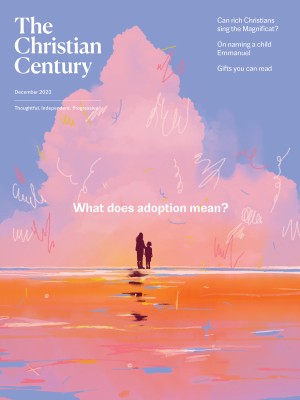No longer Black or White?
Perhaps the neither/nor of Galatians 3 isn’t really about moving beyond specific identities.

(Century illustration)
“There is no longer Jew or Greek; there is no longer slave or free; there is no longer male and female, for all of you are one in Christ Jesus.” In a world marred by the violence of a White racial imagination and the aftershocks of a White supremacist presidency, these words from Galatians 3:28 are often evoked in a spirit of hope. Trying to make sense of current conversations on race has sometimes felt disorienting, and I’ve been struck by how a kind of hope or call to move beyond race is evoked in two seemingly disparate camps.
For some, critical race theory and those who teach it are the instigators of division. They suggest that if we rewrite our textbooks and bury talk of race and racism—and all difference, for that matter—we will finally find a sense of peace. Through curricular manipulation and book bans and outright intimidation, they express their hope that the United States might return to something of what it was. What is rarely spoken in this yearning is the implicit hope for a time when Whiteness was the norm, when a seeming homogeneity offered a veneer of peace and stability and cohesion.
Read our latest issue or browse back issues.
At the other end of the spectrum are those who have no desire to return to yesterday and who are clear on the violence of racism and White supremacy. Some ask, however, if the category of race is helpful anymore. Does it reinscribe patterns of racial violence that so often render the question of race into categories of White and Black and leave countless other experiences outside? Do the mechanisms that seek racial justice and use race as an operative principle actually create equity? Perhaps it is more an issue of class and economics.
So, what good is the language of race these days? Does it do more harm than good? Does it prevent us from seeing new possibilities?
Perhaps Paul’s invocation of a new creatureliness isn’t about being beyond something so much as existing in the world in a new way. The neither/nor language of this call may not be calling us to be what we are not. How can you no longer be who you’ve been? When you emerge from the baptismal waters, does the entirety of who you were before evaporate and spin down the drain in the old water? Maybe instead it’s that the way we occupy our own lives—a Jew with a Greek as kin, a man who exists in this world in “feminine” ways—renders our lives and our bodies indecipherable in the language of our land. We become a confusing people.
This confusion emanates not because we have gone beyond the categories that seemed to bind some of us and give some of us power. The confusion is a pentecostal one, where our language, our history, our bodies, the differences pressed upon us and the differences innate to us and the differences of custom and culture and survival and thriving and exile and return—they all mingle with who we have become and who we will become. While there may be a day where notions of race will not make sense, that isn’t the world we live in today. But this is not a statement of hopelessness or surrender.
If the incarnation of the Word points to anything, it’s the possibility that God works in and through our cultural and political and social realities, not beyond them. The Word enfleshed did not come as a nonspecific humanoid entity intent on identifying with the biological category of human. As biblical scholar Mitzi Smith recently wrote, Jesus comes as the son of an enslaved woman, as a member of a people occupied and surveilled, with a complicated history of diverse traditions and ways of navigating their faith and identity, especially with respect to the Roman Empire. The Word becomes a part of our history and, in his bodied life, navigates the dynamics of power and privilege, marginalization and oppression, that mark the world he lives in.
As those who follow, who participate in his life, perhaps race is not the thing to be feared. Perhaps what we should fear is any attempt to stretch beyond the histories, the structures, the powers that shape us all so differently. And instead, ask how might we occupy those realities as tongues speakers.
Theorist Stuart Hall once wrote that the notion of identity is a misnomer. The idea that identity is stable and fixed is ultimately a repetition of the most violent instincts of White racial imagination. Instead, he suggested we understand identity as a dynamic, ongoing process of identification. Who we are communally and individually is a process of speaking and living with (or against) the language that gives our various cultures their shape. Race was never fixed; it was always an attempt for Europeans to understand themselves in a world of vast difference. Those they sought to name did not simply accept those names but adapted or pressed against or identified with them in complicated and complicating ways.
This suturing, as Hall calls it, these dynamics of identification, take the whole of our history, the realities of power in our midst, the vexing ways any number of differences combine in our individual and communal lives—and by beginning to acknowledge these various realities we can begin to see possibilities for being in this world. The tools we use to feel our way toward this new future are imperfect. But does excising histories of race, ignoring the racialized patterns of violence and inequity, get us where we want to be?
Perhaps Paul’s language of a neither/nor life means we must enter into such histories more fully: not as an attempt to hold onto difference, but as a way for the totality of our difference to truly speak.





